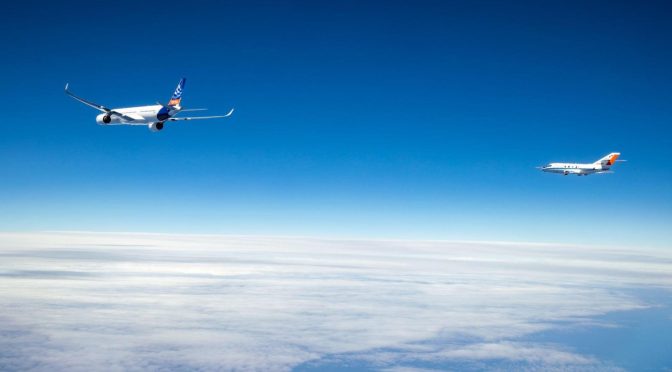Airbus and the German Aerospace Center (Deutsches Zentrum fuer Luft- und Raumfahrt; DLR) are expanding their cooperation in research on climate protection in aviation. Under an agreement signed by Nicole Dreyer-Langlet, Airbus’ VP Research & Technology Representative, Germany, and Markus Fischer, DLR Divisional Board Member Aeronautics, future joint projects will focus, in particular, on emission measurements for new types of aviation fuels, including hydrogen, and on understanding the effect of emissions on the atmosphere in conjunction with the improvement of climate models.
“We at Airbus are extremely happy to cooperate with DLR as one of the world’s leading research institutions when it comes to measuring and analysing emissions during in-flight operations,” said Nicole Dreyer-Langlet. “We are pleased to benefit from this scientific expertise when it comes to developing new concepts, as well as further optimising existing aircraft. The more precise atmospheric and climate models are, the better we can use them as a basis for developing and optimising aircraft. Climate protection in aviation is a top priority for Airbus. Partnerships with universities and research institutions such as DLR play a key role in its successful implementation.”
DLR and Airbus are already cooperating at a number of levels. For example, the DLR research aircraft Falcon 20-E has been conducting measurement flights with Airbus test aircraft, while modelling of the climate impact from air traffic using suitable design criteria for climate-optimised aircraft designs is also underway.
“With our research fleet and our diversified institutes, DLR has overall systems expertise in aeronautics research,” said Markus Fischer. “We are now increasingly collaborating with Airbus and are pleased to be working with one of the world’s leading aircraft manufacturers on a targeted path towards climate-neutral aviation.”
Currently, the partners are already successfully conducting joint flight tests as part of the Emission and Climate Impact of Alternative Fuels (ECLIF3) campaign. The focus of this study is on measuring emissions when using 100 percent Sustainable Aviation Fuel (SAF) and comparing them to conventional kerosene. Today, it is already possible to operate the Airbus fleet with 50 percent SAF but Airbus has ambitions to achieve certification for 100 percent SAF by 2030.
DLR – research for climate-neutral air transport
The consequences of climate change demand action for climate-neutral air transport. This involves new technologies that will also ensure global mobility in the future. With its 25 institutes and facilities in the field of aeronautics research, DLR is driving this change forward with technologies for sustainable, environmentally compatible flight. Expertise from DLR’s research programmes in space, energy and transport will also play an important role in this.
DLR has systems expertise in aeronautics research and sees itself in the role of an architect. DLR’s goal is ’emission-free air transport’, in order to achieve the climate targets that have been set. In doing so, the results of research must flow directly into the development of new products.
There is a considerable need for research and development on the path to climate-compatible air transport, which requires continuous funding and support. Much of this needs to be researched at a fundamental level, tested in practice and approved. DLR can do this with large-scale facilities such as its research aircraft, propulsion demonstrators and large-scale computers. In 2020, DLR published the white paper ‘Zero Emission Aviation’ together with the German Aerospace Industries Association (Bundesverband der Deutschen Luft- und Raumfahrtindustrie; BDLI). DLR is currently working on a Zero Emission strategy.


